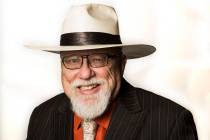Medical procedures weaken will to live
At 89 Joe Stein is doing just fine.
Yes, today the father of two grown children who wears a pacemaker to keep his heart in rhythm can sit in the living room of his Henderson home with his wife of 67 years and hand you a photograph and shake with laughter.
The picture shows the World War II veteran with his dear Helen in their courting days –– the pose has him carrying her in his arms, a preview of the day when he’d carry her over the threshold.
“I was 19 then and she was just 16 –– jailbait,” the former TV and appliance salesman said, cracking up as Helen rolled her eyes at him. “She had lied to me and said she was 18. Of course, we didn’t fool around back then.”
So many memories. There’s a photo of the Steins’ daughter, who works in the production end of the entertainment industry in California, with the late actor Jimmy Stewart.
“She got us into parties so we met a lot of big stars,” Stein said, shaking his head and grinning at the reminiscence. “She worked with (the late film and TV producer) Aaron Spelling for years.”
But the memory that made Stein call me wasn’t nearly so upbeat.
He had read a recent column I had written on Dr. Michael Casey, a University Medical Center trauma surgeon who was concerned about what he saw as a too frequent phenomenon today: people seemingly giving up the will to live.
“I thought a lot of that story was about me,” Stein said. “I understand how it can happen.”
What got Stein to the point of thinking about ending it all, he said, were medical situations that left him almost devoid of energy.
An apparent mistake during a procedure that detected bladder cancer in Joe started it off.
“He was supposed to wake up in an hour but it was five hours later and he still couldn’t,” Helen said. “It was obvious the anesthesiologist gave him too much drug. Anyway, when Joe woke up all mixed up, I thought they’d let him stay at the hospital but the doctor said since it was an outpatient procedure he couldn’t stay.”
Weakened and worried, Joe had to start chemotherapy. He only made it through two sessions before the drug regimen nearly killed him. “I was so sick I couldn’t believe it,” he said.
Having lost faith in local doctors, Joe scheduled a surgery for the day after Christmas with Dr. Sia Daneshmand, the renowned surgeon at the University of Southern California Institute of Urology. But he began to doubt whether he could go through with it.
“I felt so tired,” he said. “I felt I was going out of my mind. I’ve been through other surgeries and never felt like that beforehand. The only thing that kept me going was my family. I didn’t want to hurt them because I knew they loved me, but on the day of the surgery I still said to myself: ‘I can’t do this. I’d rather die than do this.’ If my family hadn’t been there and I had had a gun, I would have committed suicide that day.”
Soon after he entered USC hospital, he said he saw a smiling Daneshmand and his staff. Because they felt so positive about his case, he said he soon felt he would be OK.
“Something just came over me,” he recalled. “I knew everything would be fine.”
The operation took more than six hours. Stein’s bladder was removed. So was his prostate. And 63 lymph nodes.
His recovery, Daneshmand told him, has been astonishing. The cancer is gone.
After recuperating for a few weeks in Southern California, Stein drove his beloved Helen home to Henderson.
“I don’t know how you get through a tough time when you’re all alone,” Stein said. “I remember seeing in the eyes of Helen and my son and daughter and grandson how much they loved me. My grandson slept on the floor to be near me. After all is said and done, I didn’t want to let down the family I loved. For me, having a loving family gave me the will to live.”
Contact reporter Paul Harasim at pharasim@
reviewjournal.com or 702-387-2908.

















